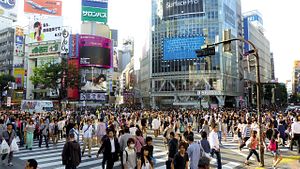On Tuesday, Abe announced plans to attract 500,000 foreign workers to Japan by 2025 to fill chronic labor shortages in farming, construction, accommodations, and elder care. The future success of the government’s signature economic policy, Abenomics, now rests on a fast-acting immigration policy. Without it, Japan’s labor shortage will stymie sustainable economic policy.
The government is bracing for the loss of 7.9 million workers by 2030 together with higher social security expenses for its graying population. In order to maintain the population at 100 million, theoretically, Japan must accept a mammoth 200,000 immigrants each year, which would lift the fertility rate to 2.07 from 1.42 by 2030. As for the current goal, welcoming 500,000 workers means accepting on average 71,430 workers each year over seven years.
In February, Abe ordered lawmakers to consider ways to bring in more low skilled foreign workers to Japan. The draft proposal will join Abe’s new economic policy outline, expected in mid-June, which aims to create a new visa category and framework covering five sectors by April 2019.
Economists have long pushed for the introduction of mass immigration in Japan, but it’s a touchy political subject stemming from a deep-rooted fear of increased crime and migrant backlash similar to that seen in Europe. The latest decision to expand the number of low-skilled foreign workers from neighboring countries is a substantial shift in direction. It wasn’t so long ago that Abe dismissed the prospect of introducing low-skilled foreign workers and foreign immigration en masse. However, Abe quashed speculation of a new “indirect” immigration policy by stressing an ease in visa restrictions for working visas limited to five years. Workers are also barred from bringing family members with them.
Abe’s labor reform is thus a temporary solution as workers are expected to return home. During a television interview in 2014, Abe said it was out of the question for Japan to adopt immigration policies in the same vein as countries like the United States, which have built themselves as a nation of immigrants.
Professor Toru Shinoda, a labor relations expert at Waseda University in Tokyo, says that while the proposal is a step in the right direction in securing the country’s future, Japan has been misinformed by a myth of homogeneity. Shinoda says Japan’s pre-World War II history reveals the mass acceptance of about 1 million immigrants and the dispatch of 100,000 Japanese around the world. He believes there isn’t anything intrinsic about Japan’s culture which prevent the acceptance of immigrants, but says undoing the myth of a homogeneous society will take several steps.
As a conservative, Abe has backed a “Japan first” immigration policy and has supported tackling Japan’s economic woes via domestic reforms such as encouraging women and retired workers to re-enter the workforce. Abe’s “Womenomics” initiative was unveiled in 2015 with an ambitious initial goal to have women occupy 30 percent of leadership positions in all fields by 2020. But the unrealistically high target for companies was lowered to 15 percent by 2025.
Shinoda says inviting low-skilled labor under rigid and temporary conditions will make Japan a less appealing working destination. In particular, Japan’s Technical Internship Program typically lures young workers from developing countries such as Indonesia, Vietnam, and the Philippines under the pretense of training and skills building. But allegations of exploitation, little to no training, and slavery-like conditions have damaged the program’s reputation.
Shinoda argues that with the rise of China and Southeast Asia, Japan must wake up to the harsh reality that it needs foreign labor more than foreign labor needs Japan. It’s a matter of survival. He stresses Japan must either learn to accept permanent immigration or risk being abandoned, isolated, and left behind.































